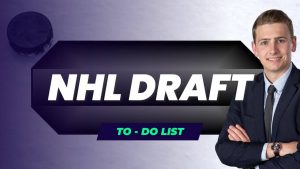[vc_row][vc_column][vc_column_text]
Better to have
Insurance is one of those things that fall in the category of “better to have and not need, then need and not have.” There are numerous types of insurance available such as life, disability, critical illness, home, vehicle, etc. Whether or not you need any of these depends on your personal situation, and your advisor can help you with this decision by performing a needs analysis.
As a professional hockey player, there are a few types of special risk insurance that may or may not be of value, depending on where you’re at in your career. Here are a few examples:
18-Year-Old Junior Player
Suppose you’re playing major junior hockey and have the potential to become a pro hockey player (i.e., have recently been drafted). In that case, there is temporary total disability insurance coverage available to protect you from a career-ending injury.
For example, you could take out a $150,000 temporary insurance policy to cover the cost of college in the event you were disabled and could no longer play hockey.
25-Year-Old Pro in Last Year of Contract
If you’re playing in the NHL, are in the last year of your current contract, and are poised to sign a big deal in the off-season, there is temporary total disability insurance available to protect you from a career-ending injury occurring before signing your next contract.
As outlined in the NHL CBA, players’ contracts are guaranteed – meaning that if you’re injured while playing, you’ll still earn your contract if you can’t play. However, if you were to get hurt in the final year of your contract and you can no longer play, you’ll lose out on the potential earnings of your next contract.
For example, if you’re likely to sign a contract worth $25,000,000 based on your current market value, you could take out a temporary policy to cover you until you sign the dotted line.
28-Year-Old Pro on 8-Year Contract
The NHL CBA outlines that players’ contracts are guaranteed if they’re injured while performing their duties as a player (i.e., training, practicing, or playing in a game). However, it is written in contracts that your contract may become void if you are injured while participating in an extreme sport (i.e., skydiving or mountain climbing).
There is temporary insurance coverage that provides 24-hour off-ice protection for the length of the players’ contract.
For example, a player on a $25,000,000 contract could take out a policy to reflect the after-tax value of their contract.
Summary
Depending on where you are at in your hockey career, it may be of value to discuss with your advisor whether or not you require any special risk insurance above and beyond what is outlined in the current CBA. Keep in mind that there are costs associated with these insurance coverage options, and your advisor must help you understand which type of policy may or may not make sense for you and your family.
Sources:
https://www.suttonspecialrisk.com/products/pro-sports-insurance
https://www.nhlpa.com/the-pa/cba
[/vc_column_text][/vc_column][/vc_row]



